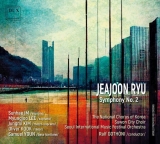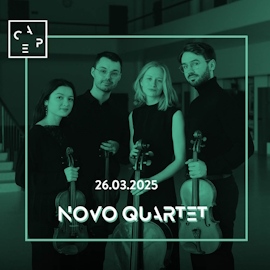Der koreanische Komponist Jeajoon Ryu (*1970) studierte bei Krzysztof Penderecki an der Krakauer Musikakademie. Er komponiert in einem neo-romantischen Stil. Seine Zweite Symphonie, die 2021 uraufgeführt wurde, ist inspiriert vom Lockdown während der Corona-Pandemie. Der Text basiert auf Sonetten, die Shakespeare schrieb, als alle Theater wegen der in London grassierenden Pest geschlossen wurden.
Die Symphonie beginnt mit einem aufgewühlten Andante con dolore, auf den ein liebliches Andantino con amabile folgt, das nach einem dramatischen Klimax den ersten Einsatz menschlicher Stimmen – zwei Solistinnen in diesem Fall – vorsieht. Vertont wurde dafür das Sonett Nr. 60, das versucht, das Wesen der Zeit zu erklären, wie sie vergeht und wie sie auf das menschliche Leben wirkt.
Das folgende Scherzo ist rhythmisch interessant und insgesamt recht charakteristisch mit seinen verspielten, teils auch militärischen Anklängen. Dieser Charakter ist auch anfangs noch im Finale spürbar, aber dann setzt eine andere Stimmung ein, wenn das Sonett Nr. 33 vertont wird, « Full many a glorious morning have I seen ». Doch Shakespeare sieht diese schönen Tage als Vergangenheit an, die Sonne bescheint, wenn auch nicht ganz hoffnungslos, eine « verlorene Welt ». Entsprechend dramatisch wird der Satz aufgebaut.
Die engagierten Interpreten liefern unter der Leitung von Ralf Gothoni eine spannende und ausdrucksstarke Interpretation.
The Korean composer Jeajoon Ryu (*1970) studied with Krzysztof Penderecki at the Krakow Academy of Music. He composes in a neo-romantic style. His Second Symphony, premiered in 2021, is inspired by the lockdown during the Corona pandemic. The text is based on sonnets Shakespeare wrote when all theaters were closed because of the plague that was rampant in London.
The symphony opens with an agitated Andante con dolore, which is followed by a lovely Andantino con amabile that, after a dramatic climax, features the first use of human voices – two female soloists in this case. Set to music for this purpose is Sonnet No. 60, which attempts to explain the nature of time, how it passes and how it affects human life.
The following scherzo is rhythmically interesting and altogether quite characteristic with its playful, sometimes military echoes. This character is still felt initially in the finale, but then a different mood sets in when Sonnet No. 33 is set to music, « Full many a glorious morning have I seen. » But Shakespeare sees those beautiful days as a thing of the past, the sun shining, if not quite hopelessly, on a « lost world. » Accordingly, the movement is built up dramatically.
The committed performers deliver an exciting and expressive interpretation under the direction of Ralf Gothoni.






















